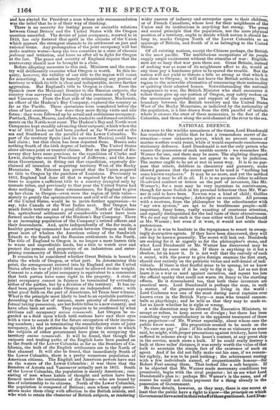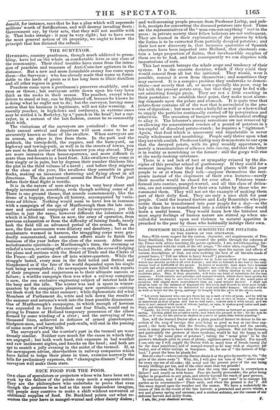NATIONAL DEFENCE.
APROPOS to the warlike uneasiness of the times, Lord Dundonald has reminded the public that he has a tremendous secret of de- struction—some unknown power, which no present means of marine warfare could resist, while it would supersede cumbersome stationary defences. Lord Dundonald is not the only person who vaunts the possession of such terrible secrets : we remember Mr. Warner for one, and there may be more. The slighting disregard shown to these persons does not appear to us to be judicious. The matter ought to be set at rest in some way. It is to no pur- pose that others, dabblers in chemistry and gunnery, make shrewd guesses that the secret agent to be used is "nothing but some known explosive." It may be no more, and yet the method of using it may be all in all. It is to no purpose either to adduce ill-advised conduct or letters on the part of inventors, like Mr. Warner's; for a man may be very ingenious in contrivances, though far more foolish in his personal behaviour than Mr. War- ner is said to have been. Newton was a kind of child; Galileo a self-important wrangler ; Arkwright an eccentric. All persons with a nostrum, from the philosopher to the schoolmaster with "my own system," are apt to be troublesome people—self- important, fussy bores, vastly exacting of courteous attention, and equally distinguished for the bad taste of their obtrusiveness. We do not say that such is the case either with Lord Dundonald or Mr. Warner ; but even if it were, it would not settle their pretensions.
Nor is it wise to hesitate in the repugnance to resort to sweep- ingly destructive agents. If they have been discovered, they will one day be known generally. The secret will leak out. Hundreds are seeking for it as eagerly as for the philosopher's stone, and what Lord Dundonald or Mr. Warner has discovered may be found out by some one else. If there is anything in it but a shadow, let us know it. It is not well that the custody of such a secret, with the power to give foreign enemies the first start, should rest entirely on the patriotic virtue and self-denial of indi viduals. If there is that fearful mine to be sprung, let us know its whereabout, even if it be only to dig it up. Let us not first learn it in a war as used against ourselves, and repent too late the official apathy that could not warm its fancy to the startling effects. Be it remembered too, that both these inventors are practical men. Lord Dundonald is perhaps the man, in such a matter, of the greatest experience living in the world : Lord Cochrane was one of the most daring naval captains ever known even in the British Navy—a man who treated cannon- balls as playthings and he tells us that they may be made so. Let us know whether he is right or wrong.
A wide discretion may be allowed the Executive Ministers, to
accept or refuse, to keep secret or divulge ; but there has been something very unsatisfactory in the apparent treatment of these two projectors—of Mr. Warner especially, about whose case the public know most. His proposition seemed to be made on the
No cure no pay" plan : if his scheme was so visionary as some
said, he might, with proper precautions against trickery, have been suffered to scheme away to his heart's content, at any great ship in the service, much more a hulk. If he could really destroy a hulk at three miles' distance, it was surely worth the value of that hulk to ascertain the simple fact of the existence of such an agent. And if he did not fully make out his case, if we remem- ber rightly, he was to be paid nothing; the arbitrement resting with a few individuals named, of unquestionable honour—Sir Robert Peel among them. That looked like a safe bargain. If it be objected that Mr. Warner made mercenary conditions too prominent, begin with the rival projector : let us see what Lord Dundonald's plan is : perhaps Mr. Warner's is the same, and of course he could not claim payment for a thing already in the possession of Government. Be these details, however, as they may, there is one secret at least that the public have .a right to know—the principle on whids Government have acted in theirrebuffofthosegentlemen. Lorti.Dim-
donald, for instance, says that he has a plan which will supersede millions' worth of fortifications, and will destroy invading fleets : Government say, by their acts, that they will not meddle with it. That looks strange : it may be very right ; but to have even the most general notion of its propriety, we ought to know the principle that has dictated the refusal.



























 Previous page
Previous page